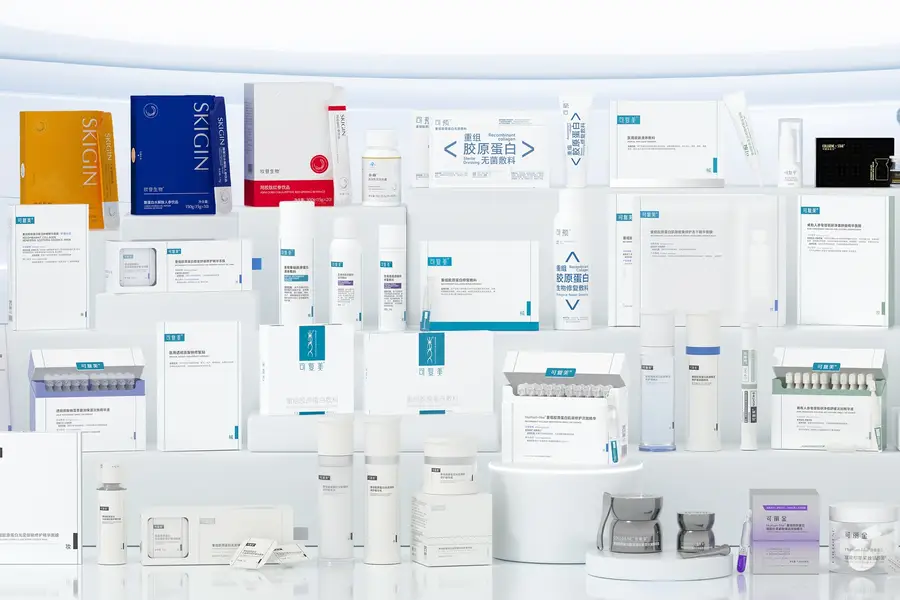Biogene gets bruised in ‘Battle of the skincare belles’

A squabble involving false advertising claims by a sinking Bloomage Biotech against highflying rival Giant Biogene has captivated China, with no end in sight
Key Takeaways:
- Shares of Giant Biogene have plunged 30% in the month since it was accused of false advertising by rival Bloomage Biotech
- Biogene’s stock had more than doubled before the squabble on success of its collagen skincare products, making it vulnerable to an attack by its jealous rival
By Edith Terry
A fight between skincare brands owned by two of China’s wealthiest women has mesmerized the country with saturation media coverage – and left one of the pair’s formerly highflying stocks badly bruised.
In nearly a month since the skirmish began on May 17, shares of Giant Biogene Holding Co. Ltd. (2367.HK) have shed nearly 30% of their value, while Bloomage BioTechnology Corp. Ltd. (688363.SH), which initiated the dust-up, is up about 7%.
While the allegations have the potential to dent both companies’ reputations, the selloff for Biogene’s stock, in particular, seems overblown. In its latest annual results, Biogene reported its revenue soared 57.2% last year to 5.5 billion yuan ($765 million), fueling a 42.4% profit gain to 2 billion yuan. Bloomage is moving in the other direction, reporting its revenue fell 12% last year to 5.37 billion yuan, as its profit plunged 71% to 174 million yuan.
So, how did this squabble between rising beauty Biogene and a fading Bloomage begin?
The two are known for different core products. Bloomage’s use hyaluronic acid (HA), which helps the skin retain moisture. Biogene uses recombinant collagen, which helps new cells grow in the skin layer. Recombinant collagen has become all the rage lately, fueling Biogene’s rapid rise and prompting Bloomage to invest in that area as well.
The fight may also have a personal element, either real or perceived, with much of the media attention focused on presumed tension between Biogene founder Fan Daidi and Bloomage founder Zhao Yan, two of China’s wealthiest women.
Fan, a biochemist and former visiting scholar at MIT, founded Biogene in 2000 and built it into an industry-leading brand in 2024, according to Euromonitor. Its star product, “Comfy Collagen Stick” ranked first in sales on e-commerce platforms in China during the June 18 shopping festival last year.
Zhao started out as a banker, launching Bloomage in 2001 with an initial focus on the raw materials market for HA. In 2017 her company acquired Revitacare, a French maker of HA compounds. Bloomage then launched Biohyalux, a heavily discounted skincare brand, and has 44% of the global market for HA raw materials.
Bloomage fired the first shot in the battle by publishing a 5,000-word report on its official WeChat account accusing nine equity research houses of playing up the merits of recombinant collagen over HA. “The HA industry has encountered lies and trampling, and has been described as ‘outdated,’ ‘not as safe as a certain substance,’ ‘not as biologically active as a certain substance,’ ‘not as market-valuable as a certain substance,’” the report said, in a thinly veiled reference to recombinant collagen.
A media field-day ensued, with some reports likening Zhao to a Chinese empress taking aim at imperial powers from the West.
The battle heated up 10 days later when beauty influencer Hao Yu, better known as “Dr. Big Mouth,” who made headlines after previously accusing an Estee Lauder product of false advertising and discrimination against Chinese, took aim at Biogene. In his attack, Hao claimed the company had violated China’s cosmetic labeling regulations after he found only trace levels of recombinant collagen in a Comfy product he tested.
Quick rebuttal
The Comfy brand quickly released a statement saying that it had immediately conducted tests showing more than 0.1% collagen content, well above Hao’s finding of just 0.0177%. Biogene also commissioned third party testing agents to conduct independent tests.
Bloomage admitted days later that Hao was effectively on its payroll through an investment relationship.
But that didn’t end the fight. On June 4, Comfy shared the test results on its website, saying it had not made any “false or misleading” claims for its product. One of the testing agencies cited by Hao also accused him of using its test results without permission and issued a letter of apology cited by Biogene.
That didn’t stop Hao from continuing the fight, accusing Biogene a day later of pressuring testing institutions not to test the company’s recombinant collagen products. He added that he had received a message from one such major company refusing to conduct a test because it didn’t want to get caught up in the slugfest.
There are plenty of signs that financial pressure on Bloomage may have been partly behind its attacks against its up-and-coming rival. Bloomage previously delayed publication of its full-year results for 2024, publishing them just two weeks before its first-quarter results. Its first-quarter financials were also weak, showing the company’s revenue fell 20.7% year-on-year to 1 billion yuan.
In addition to weak financials, Bloomage is also being plagued by other issues, including executive departures, changes to its management team and an internal anti-corruption campaign.
Revenue from Bloomage’s skincare products declined by 32% in 2024 to 2.57 billion yuan, accounting for 48% of total revenue. According to Wind data, the company’s market value peaked at 140 billion yuan in 2021, and has shriveled since then to a current 26 billion yuan. In December 2024, it was removed from the CSI 300 Index for China’s most important publicly traded companies.
Meanwhile, Giant Biogene has moved in the opposite direction. Its revenue and net income both doubled between 2022 and 2024, and the company raised $80 million in its 2022 Hong Kong IPO. Since then, its stock has more than doubled from its IPO price of HK$24.30 to its latest close of HK$60.60 on Wednesday, giving the company a market cap of about HK$61 billion ($7.8 billion). The company is in a market that will grow by an average 55% annually between 2022 and 2027 to reach 64.5 billion yuan, according to independent research.
Biogene is hardly the only Chinese company benefitting from recent positive publicity for recombinant collagen skincare products. Other beneficiaries include Jinbo Bio-Pharmaceutical, Guangdong Marubi Biotechnology (603983.SS), and FREDA (600223.SS). But as the Biogene-Bloomage dust-up shows, highflying companies – and their investors – often make easy targets for jealous rivals.
To subscribe to Bamboo Works weekly free newsletter, click here





